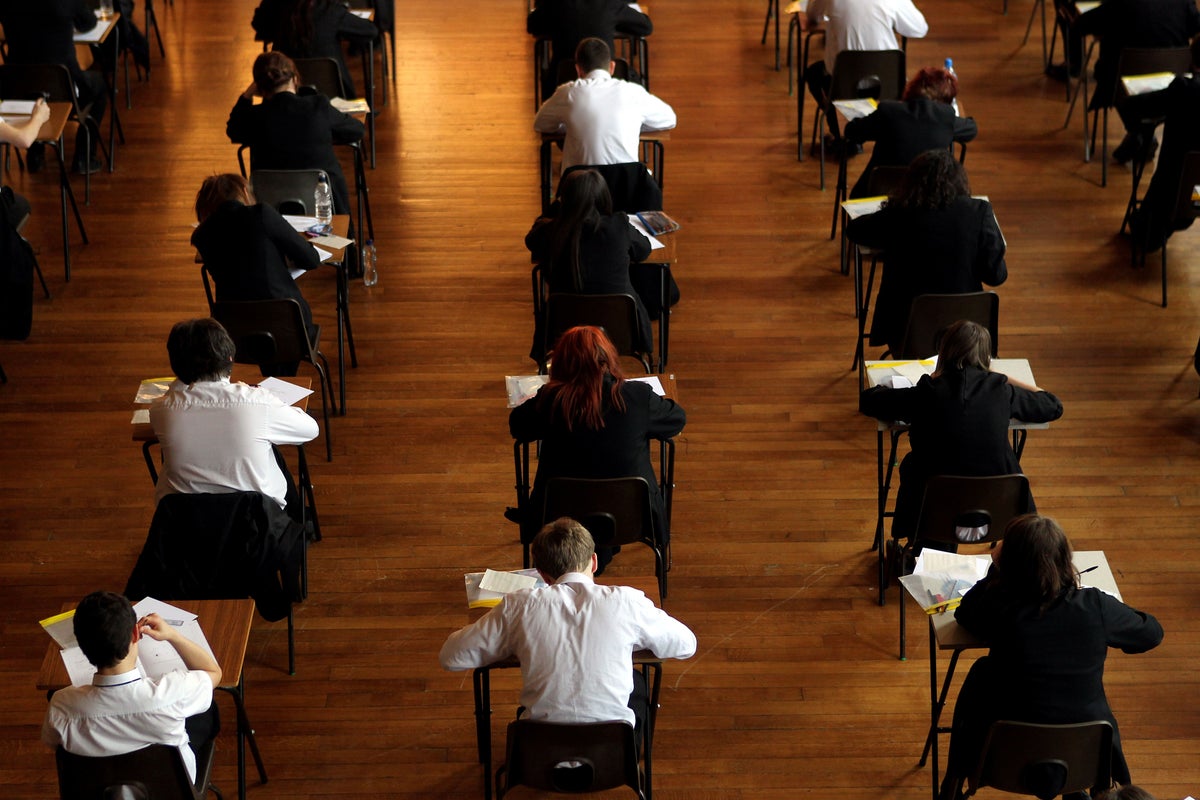
The Government’s policy of making students resit maths and English GCSEs is “not fit for purpose” and it can undermine young people’s “confidence and motivation”, education leaders have warned.
Politicians have been urged to “rethink” how young people are encouraged to gain English and maths skills after the number of post-16 students taking GCSE resits in the two subjects increased this year.
The rise in young people resitting their exams is partly down to a growing number of teenagers in the population, as well as the return to pre-pandemic grading standards in England in 2023, the Ofqual chief has suggested.
In England, many students who do not secure at least a grade 4 – which is considered a “standard pass” – in English and/or maths GCSE are required to retake the subjects during post-16 education.
The proportion of 16-year-old entries in England securing at least a grade 4 in English language has dropped from 71.2% last year to 70.6% this year – although it is above the pre-pandemic year of 2019, when the figure was 70.5%.
In maths, the proportion of 16-year-old entries in England securing at least a grade 4 has fallen from 72.0% in 2024 to 71.9% this year, though this is higher than 71.5% in 2019.
Students in England are funded to retake maths and/or English until they achieve a GCSE grade 9 to 4.
For students with a grade 2 or below, they can either study towards a pass in functional skills level 2 or towards a GCSE grade 9 to 4.
PA news agency analysis of figures by Ofqual suggests that 183,450 16-year-olds in England did not achieve a grade 4 or above in English language this year, 1,770 more than in 2024.
In maths, it is likely that 174,930 16-year-olds did not achieve a grade 4 or above, 970 fewer than last year.
The Government launched a curriculum and assessment review last summer.
Ahead of the review’s final report, which is due in the autumn, education leaders have called on policymakers to look again at the GCSE resits policy.
The Education Secretary has said the review will look at how to support young people who do not achieve the “right level” in maths and English at GCSE.
Pepe Di’Iasio, general secretary of the Association of School and College Leaders (ASCL), said: “Once again we see that the majority of students who retake GCSE English and maths in post-16 education under a Government policy of mandatory resits continue to fall short of a grade 4 standard pass.
“It is utterly demoralising for these young people and there has to be a better way of supporting literacy and numeracy.
“We urge the curriculum and assessment review to grasp this nettle.”
Catherine Sezen, director of education policy at the Association of Colleges (AoC), said: “Across the country, educators are working hard to improve outcomes, yet many are left asking what more can be done.
“After a decade of the condition of funding policy, it is time to rethink how we support young people to build essential English and maths skills.”
She added that the AoC is calling for “a more flexible, evidence-based approach” which empowers colleges to meet learners’ needs “without relying on repeated resits that can undermine confidence and motivation”.
Paul Whiteman, general secretary of the NAHT school leaders’ union, said the current GCSE resit policy was “not fit for purpose”.
He said: “NAHT has long called for reform of the current policy that forces students into repeated resits, which is demotivating and ineffective.
“What is needed are more appropriate and engaging alternatives to GCSEs in English and maths at KS4.
“Post-16 students who need to continue the subjects must be allowed to study for qualifications that suit their needs and ambitions, rather than defaulting to GCSE resits.”
Jill Duffy, chief executive of the OCR exam board, added that Thursday’s figures showed a “resit crisis.
She said: “Tinkering at the edges of policy won’t fix this. We need fundamental reform to maths and English secondary education – especially at Key Stage 3 – to support those who fall behind in these crucial subjects.”
UK GCSE entries for students aged 17 and over has risen by 12.1% compared with last year.
On the rise in the number of post-16 students taking resits, Sir Ian Bauckham, chief regulator at England’s exams regulator Ofqual, said it was linked with the “rising demographic trend”.
He told PA: “If you’ve got a larger cohort – and proportions getting a grade four are broadly stable – you’re going to see more people coming through to resit.
“But the reset of normal grading standards in 2023 probably also plays into it as well.”
Sir Ian said: “My view is that the Government’s policy that students continue to study English and maths post-16 if they haven’t reached that critical grade four threshold is the right thing to do.
“The policy is not that students do multiple resets. The policy is that they continue to study English and maths and sit, when appropriate, either for GCSE or for a functional skills qualification.”
Speaking to PA earlier this month, Education Secretary Bridget Phillipson said: “The curriculum and assessment review is looking at how best we can support 16 to 19-year-olds who don’t achieve the right level in maths and English.
“Of course I do want more students – particularly from less well-off backgrounds – to get a good pass at GCSE in English and maths because that’s the gateway to so much more.
“But the curriculum and assessment review is going to look at the approach we will take in the years to come.”
